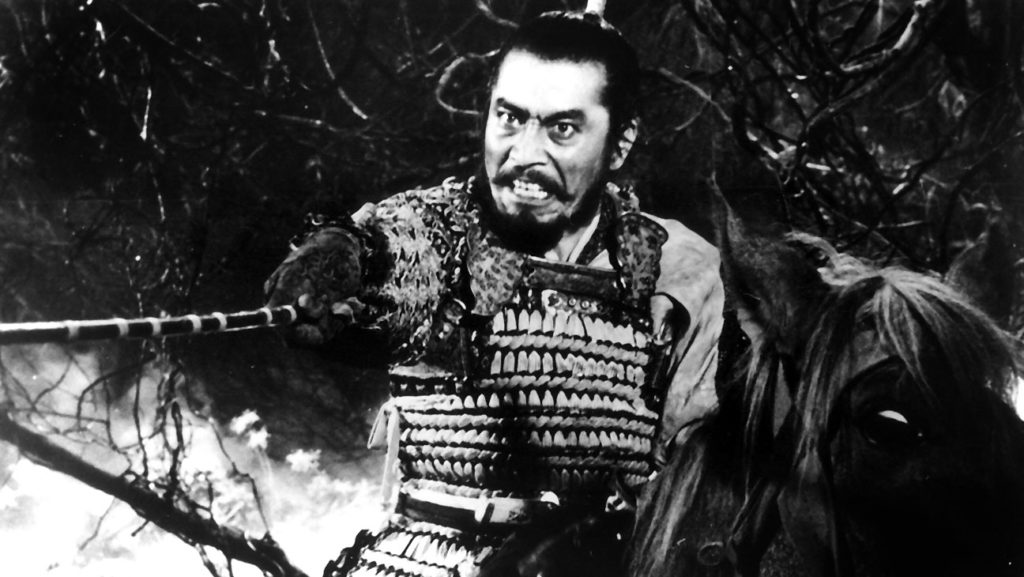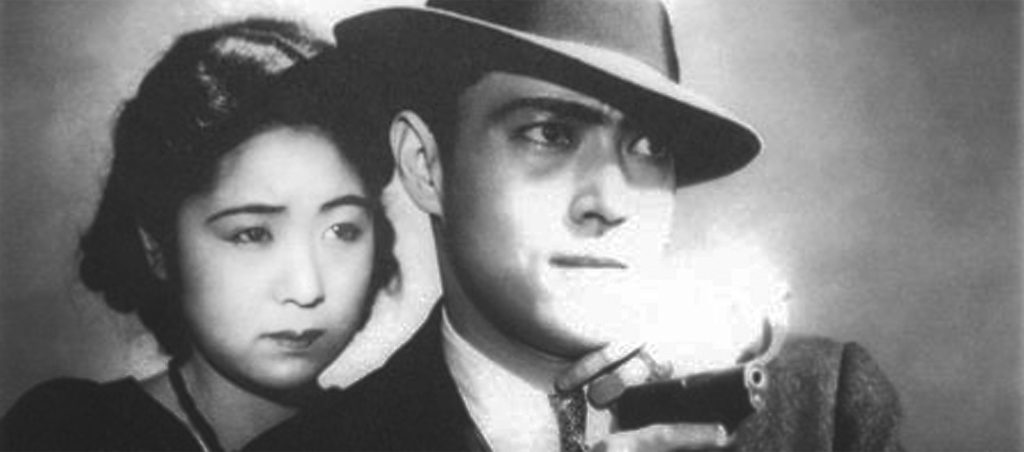Films: Japan 2021
October 18, 2021 · 0 comments
by Jeremy Clarke.

So, Scotland Loves Anime is over (save a few stragglers at the Film House) and you’re wondering where you can see more Japanese movies. Today, the BFI finally kicks off its major Japan season originally scheduled for 2020 at London’s BFI Southbank. Originally intended to coincide with the Tokyo Olympics, the programmers rejigged the programme and put parts of it out online from May to September 2020 via the excellent BFI Player platform while Sight & Sound’s wonderful anime special was out on the shelves for around three months thanks to lockdown. The BFI Player season may have been a little thin on the ground as far as animation was concerned, but it contained a wealth of other riches. A more comprehensive, two-month anime season at BFI Southbank is promised for April and May 2022.
The season as was had over 20 Akira Kurosawa films which will remain on BFI Player for the duration including Seven Samurai (1954), which this site covered last year and which finally gets reissued as a brand new print in cinemas around the UK from 29th October this year, some eighteen months after originally planned, along with prints of Throne of Blood (1957, pictured) and Yojimbo (1961). I still have fond memories of seeing a print of Seven Samurai on the morning of Friday 13th (!) March 2020, the last press screening before sudden lockdown scuppered UK cinema exhibition from that evening onwards.
The 2021 cinema season also contains a smattering of classic directors Mizoguchi (My Love Has Been Burning, 1949; Sansho the Bailiff, 1954) and Naruse (Yearning, 1964) and one kaiju eiga, Ishiro Honda’s Godzilla (1954), along with the more recent likes of Juzo Itami’s Tampopo (1985), Naomi Kawase’s debut Suzaku (1997) and Hirokazu Koreeda’s After Life (1998). Halloween sees a special J-Horror Weekender (29th-31st October) with Hideo Nakata’s Ring (1998) and Dark Water (2002), Kiyoshi Kurosawa’s Cure (1997) and Pulse (2001) and Takeshi Miike’s Audition (1999) and Ichi the Killer (2001). There are even BFI Waterloo IMAX outings of Otomo’s Akira (1988) and Fukusaku’s Battle Royale (2000). A specially curated BFI, UK-wide touring season features a handful of Ozus, Kurosawas, Kon Ishikawa’s An Actor’s Revenge (1963) and Toshio Matsumoto’s Funeral Parade of Roses (1968). The 21st century appears to be woefully under-represented in all the above.

In addition there are various inventive, accompanying mini-seasons in specific locations around the UK. Screen Argyll presents Japan: Family, Community and the Sea with Kawase’s Still the Water (2014), Mizuho Nishikubo’s Giovanni’s Island (2014, pictured) and Hayao Miyazaki’s Ponyo (2008). Two Evangelion movies are screening country-wide in November with the original ADV dub. Sheffield Loves Anime hits the Showroom Cinema (Sheffield) with Naoko Yamada’s A Silent Voice (2016), Yu Kamatani’s Looking for Magical Doremi (2020) and Yoshiaki Kawajiri’s Cyber City OEDO 808 (1990) (19th to 21st November). Teinosuke Kinugasa’s seminal horror outing A Page of Madness (1926) and Yasujiro Ozu’s gangster movie Dragnet Girl (1933) crop up in the Yorkshire Silent Film Festival (17th and 30th October).
Not to be outdone, the Cambridge Film Festival has recent Japanese films including UK premieres of Yusuke Hirota’s anime Poupelle of Chimney Town (2020) and Allegra Pacheco’s documentary Salary Man (2021) (18th-25th November). Reading Biscuit Factory promises to celebrate “the breadth and variety of Japanese filmmaking” including a remastering of Mamoru Oshii’s Ghost in the Shell (1995) (late October and throughout November). Belgrade Theatre, Coventry has a season exploring the links between Indian and Japanese cinema (November and December). Chapter, Cardiff has a season of Nobuhiko Ōbayashi’s films including House (1977) for Halloween (30th-31st October). Belfast Film Festival includes a selection of surrealist Japanese films (November 4th-13th). Meanwhile Day for Night have a touring programme called Urban, Natural, Human: Exploring Japan on Screen (November and December).

Alongside the BFI’s online coup of numerous Kurosawa movies comes a similar quantity of Yasujiro Ozu movies on BFI Player, a rare chance to get an overview of one of Japan’s most popular domestic talents. Ozu (1903-1963) is best known for Tokyo Story (1953, pictured) in which an ageing couple (including Ozu regular Chishu Ryu, who often played fathers for the director) visit their grandchildren only to discover that, under the pressure of life in the big city, their grandchildren don’t have time for them. Setsuko Hara is memorable as the war widow of the couple’s late son and the only person to pay them any real attention.
This movie typifies Ozu’s work: once he found his voice as a director, he settled on making character-driven, family dramas wherein, on one level, nothing much happens yet, on another level, everything that’s going on is completely compelling. He often places the camera on the tamami mat, shooting from the point of view of a sitting Japanese. He rarely moves the camera, instead putting considerable effort into shot composition so that, even as we watch what’s on the screen, we’re often wondering what’s going on just outside of camera range. The more of his films you watch, particularly from the mid-forties onward, the more apparent his distinctive style becomes.
Ozu had an impressive career as a silent film director at Shochiku in the late twenties and thirties before transitioning into the sound era with the same studio, at which he stayed for his forty-year career. Although many of his silent films are lost, a sizeable number have survived. These works are a mixture of comedies, crime movies and dramas.

Comedies like I Graduated But… (1929), I Flunked But… (1930) and I Was Born But… (1932) are all about coming to terms with various disappointing aspects of life, be they in the job market, college exam results or childhood. There’s a lightness of touch about these films, a gently engaging quality. Although comedic in tone, they demonstrate a genuine affection for everyday life and its attendant problems. They border on drama.
Ozu tackled darker material during this period too. Dragnet Girl (1933, pictured) still feels quite light with its good-girl store owner and bad-girl moll battling it out for a gangster’s affections. That Night’s Wife (1930) is much more successful. It deals not with romance but a crisis of married life when a man with a sick daughter is pursued to his home by police after taking part in a robbery. A similar mixture of sensibilities attends Woman of Tokyo (1933) in which a college student’s world is shattered when he learns that his elder sister is paying for his tuition fees through prostitution.
A Mother Should be Loved (1934) is not a comedy and has no pretensions to a crime movie. After their father dies, two boys learn that one of them has a different father, a fact which over the years affects their relationship with each other as well as their individual relationships with their mother. And it doesn’t end well.
If these surviving works are as impressive as anything by any silent film director, nothing in them quite prepares you for what happens when he starts working with sound in the mid-1930s. It’s as if the silent films had dialogue which couldn’t be recorded. Ozu’s sound works have a whole other layer to them. The Only Son (1936) shows a poor country mother investing her meagre resources into her son’s education only for him to become a poorly paid Tokyo teacher.

Ozu really hits his stride in the 1940s. Brothers And Sisters of the Toda Family (1941) sees a widow and her youngest daughter avoided by her other, grown up children with their busy lives much as most of the family in Tokyo Story ignore the visiting parents. The earlier film might almost be a blueprint for the second (which explains why the BFI shrewdly put it on the Blu-ray disc of the latter as an extra).
Perhaps the most shocking thing anywhere in his work comes in A Hen in the Wind (1948) when a woman who has sunk to prostitution to pay her son’s essential medical bills topples (or is she pushed?) down the stairs in a shot in which the falling appears completely real. There’s no onscreen physical sex or violence anywhere else in the film, although the former is clearly implied as off-screen action, which renders this one unexpected shot, when it comes, deeply traumatic. Not least because the exact same angle of the staircase features several times without the slightest intimation of accident or violence.
Most of the best known films in the Ozu canon, including Tokyo Story, were made in the 1950s and if one stretches the decade a little to include 1949 and the few years in the early sixties before his death on his sixtieth birthday, that includes most of his major works. Since half a dozen have similar seasonal titles like Early Summer (1951) or Early Spring (1956, about two office workers having an affair), it’s terribly easy to get confused as to which is which. Many of the plots contrast the arranged marriages of the older generation with contemporary women who want to marry for love. The Flavour of Green Tea over Rice (1952) also follows this template. Prints of these four films will be touring the UK.
One of the director’s finest works Late Spring (1949) sees father Chishu Ryu push daughter Setsuko Hara into marriage when she’d much rather stay at home looking after her dad. This seems to be a common theme in Ozu. The uncharacteristically dark Tokyo Twilight (1957) has Hara’s younger sister Ineko Arima defy single-parent dad Ryu to get herself pregnant, get in trouble with the police and ultimately bring tragedy upon herself and her family.
Late comedies Equinox Flower (1958), Late Autumn (1960) and An Autumn Afternoon (1962, the director’s final film) explore similar father-daughter relationships. Like these films, Good Morning (1959) was a comedy made in colour and is glorious to behold. It’s a hymn to the joys of family life loosely reworking the silent I Was Born But…, a comparison with which shows just how far Ozu had come in his 40 years of directing.
BFI Japan runs at London’s BFI Southbank from 18th October-30th December with films up to the mid-1960s up to 30th November and films from 1964 onwards for December. It also tours around the UK. The J-Horror Weekender runs 29th–31st October. There will be an accompanying Japan 2021 programme on BFI Player. Jeremy Clarke’s new website is jeremycprocessing.com
Leave a Reply